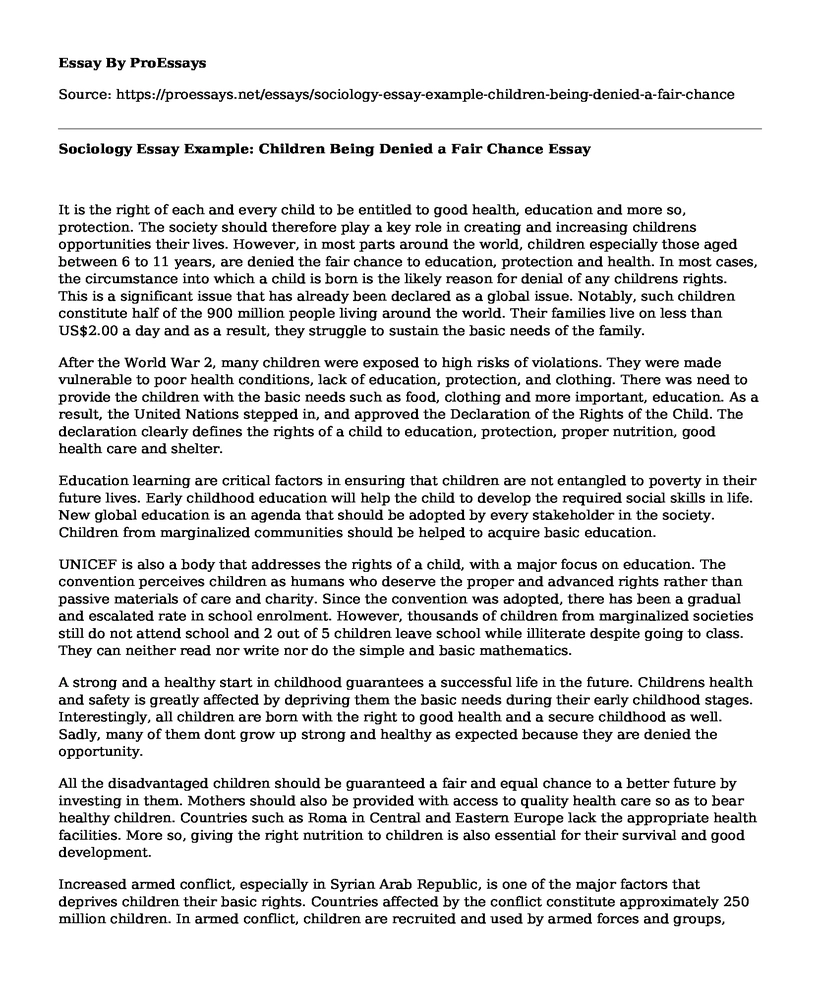It is the right of each and every child to be entitled to good health, education and more so, protection. The society should therefore play a key role in creating and increasing childrens opportunities their lives. However, in most parts around the world, children especially those aged between 6 to 11 years, are denied the fair chance to education, protection and health. In most cases, the circumstance into which a child is born is the likely reason for denial of any childrens rights. This is a significant issue that has already been declared as a global issue. Notably, such children constitute half of the 900 million people living around the world. Their families live on less than US$2.00 a day and as a result, they struggle to sustain the basic needs of the family.
After the World War 2, many children were exposed to high risks of violations. They were made vulnerable to poor health conditions, lack of education, protection, and clothing. There was need to provide the children with the basic needs such as food, clothing and more important, education. As a result, the United Nations stepped in, and approved the Declaration of the Rights of the Child. The declaration clearly defines the rights of a child to education, protection, proper nutrition, good health care and shelter.
Education learning are critical factors in ensuring that children are not entangled to poverty in their future lives. Early childhood education will help the child to develop the required social skills in life. New global education is an agenda that should be adopted by every stakeholder in the society. Children from marginalized communities should be helped to acquire basic education.
UNICEF is also a body that addresses the rights of a child, with a major focus on education. The convention perceives children as humans who deserve the proper and advanced rights rather than passive materials of care and charity. Since the convention was adopted, there has been a gradual and escalated rate in school enrolment. However, thousands of children from marginalized societies still do not attend school and 2 out of 5 children leave school while illiterate despite going to class. They can neither read nor write nor do the simple and basic mathematics.
A strong and a healthy start in childhood guarantees a successful life in the future. Childrens health and safety is greatly affected by depriving them the basic needs during their early childhood stages. Interestingly, all children are born with the right to good health and a secure childhood as well. Sadly, many of them dont grow up strong and healthy as expected because they are denied the opportunity.
All the disadvantaged children should be guaranteed a fair and equal chance to a better future by investing in them. Mothers should also be provided with access to quality health care so as to bear healthy children. Countries such as Roma in Central and Eastern Europe lack the appropriate health facilities. More so, giving the right nutrition to children is also essential for their survival and good development.
Increased armed conflict, especially in Syrian Arab Republic, is one of the major factors that deprives children their basic rights. Countries affected by the conflict constitute approximately 250 million children. In armed conflict, children are recruited and used by armed forces and groups, thereby denying children the ideal opportunity for development. Apparently, thousands of children have died from exposure to the armed conflict issue. Afghanistan and Somalia are also among the most affected countries.
However, there have been combined and determined efforts by the entire world to condemn this act of conflict. Nevertheless, armed conflict remains a threat to the protection of children who have initially been affected. A quick action should also be taken so as to save such children who are vulnerable to grave violations.
The Millennium Development Goals (MDGs) is a force that has played a significant role in reducing child deaths. Additionally, the MDGs have made good efforts to increase the number of children in schools and to provide access to healthy food and water to children and their families. The goals also aims at protecting children from any form of violence. The Sustainable Development Goals (SDGs) is a force that was adopted in the September of 2015 by the world leaders. The movement aims at eradicating poverty by 2030. Consequentially, child death will reduce by 50% especially in the sub-Saharan Africa.
As part of a proposed global agenda, governments from all over the world especially in developing countries, should rewrite the right to free and accessible education. As a result, all children aged between 6 to 11 years will be entitled to the free education by 2030. Equally, the health and well-being of children as well their development is significant. Childhood care is equally important to all the children. All development countries should embrace and prioritize all the objectives of the rights of children.
Work cited
Arnas, Neyla. Fighting chance: global trends and shocks in the national security environment. Potomac Books, Inc., 2009.
Veeran, DL Vasintha. "Combating child labour-A South African challenge." Social Work/Maatskaplike Werk 39.1 (2014)
Priscoli, Jerome Delli, James Dooge, and Ramon Llamas. "Water Ethics."
.
Cite this page
Sociology Essay Example: Children Being Denied a Fair Chance. (2021, Apr 26). Retrieved from https://proessays.net/essays/sociology-essay-example-children-being-denied-a-fair-chance
If you are the original author of this essay and no longer wish to have it published on the ProEssays website, please click below to request its removal:
- Sociology Essay Example: What Poverty Means
- Why Service to Community/Country Is Important to Me
- Income Inequality in the US Essay
- There Is No Objectivity Essay Example
- Research Paper on Foster Care Services: A Viable Intervention for Neglected Children
- Research Paper on Uniting for Change: Community Organizing and Grassroots Development
- Substance Abuse Rising: Adolescence & Young Adulthood at Risk - Essay Sample







